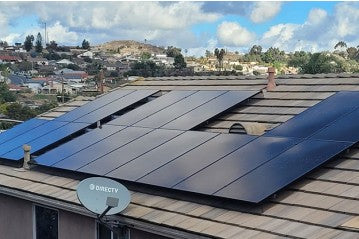
In an era where sustainable living and self-sufficiency are gaining prominence, off-grid solar battery systems have emerged as a reliable and eco-friendly solution for powering homes. With the ability to harness the sun's energy and store it for later use, these systems provide homeowners with independence from the traditional power grid. In this blog post, we will delve into the inner workings of off-grid solar battery systems, shedding light on their components, functionality, and benefits.
Off-Grid Solar Battery Systems: An Overview
Off-grid solar battery systems are a comprehensive solution designed to generate and store electricity independently from the utility grid. By harnessing sunlight through solar panels, these systems convert the sun's energy into usable electrical power. The excess energy is stored in deep cycle batteries, which can be utilized during times of low solar production, such as nighttime or cloudy days. This self-sustaining approach allows homeowners to maintain a reliable power supply even in remote areas or during grid outages.
Understanding Solar Panels and their Role
At the heart of every off-grid solar battery system are solar panels, responsible for capturing sunlight and converting it into electricity. These panels consist of photovoltaic (PV) cells that generate direct current (DC) electricity when exposed to sunlight. The DC power produced by the solar panels is then fed into the charge controller for regulation and optimization.
When selecting solar panels for an off-grid house, factors such as efficiency, durability, and compatibility with the system should be considered. Monocrystalline, polycrystalline, and thin-film solar panels are popular choices, each with its own advantages and suitability for different environments.
The Role of Charge Controllers
Charge controllers play a crucial role in the proper functioning and longevity of off-grid solar battery systems. These devices regulate the flow of electricity from the solar panels to the batteries, preventing overcharging or deep discharging, which can damage the batteries. Charge controllers also optimize the charging process, ensuring maximum efficiency and extending the lifespan of the batteries.
There are different types of charge controllers available, such as PWM (Pulse Width Modulation) and MPPT (Maximum Power Point Tracking). PWM controllers are cost-effective and suitable for smaller systems, while MPPT controllers are more efficient and recommended for larger installations.
The Heart of the System: Deep Cycle Batteries
Deep cycle batteries are the energy storage hub of an off-grid solar battery system. Unlike traditional car batteries, deep cycle batteries are designed to provide a steady amount of power over an extended period. These batteries can withstand frequent charging and discharging cycles, making them ideal for off-grid applications.
Lead-acid and lithium-ion batteries are the two primary types used in off-grid systems. Lead-acid batteries are reliable and cost-effective, while lithium-ion batteries offer higher energy density, longer lifespan, and better efficiency. Proper maintenance, including regular monitoring of battery health and ensuring adequate ventilation, is essential for maximizing the performance and lifespan of deep cycle batteries.
Power Inverters: Converting DC to AC
To power household appliances and devices, the direct current (DC) electricity stored in the batteries must be converted into alternating current (AC). This is where power inverters come into play. Power inverters convert DC electricity into AC electricity that can be used to run lights, appliances, and other electronic devices in your home.
There are various types of inverters available, including modified sine wave and pure sine wave inverters. Modified sine wave inverters are more affordable but may not be compatible with certain sensitive electronic devices. Pure sine wave inverters, on the other hand, produce a clean and stable AC waveform, ensuring compatibility with all types of appliances.
Maximizing Efficiency and Managing Energy
Efficiency and effective energy management are key factors in optimizing the performance of an off-grid solar battery system. Incorporating energy monitoring and management systems can provide real-time data on energy production and consumption, helping homeowners make informed decisions to reduce waste and increase efficiency.
Techniques such as load balancing, where power usage is evenly distributed across different times of the day, can maximize the utilization of solar energy. Regular system maintenance, including cleaning solar panels and checking connections, ensures optimal performance and longevity of the system.
Safety Considerations and Backup Solutions
Safety should always be a priority when dealing with off-grid solar battery systems. It is essential to follow safety guidelines provided by manufacturers and consult professionals during installation and maintenance. Backup solutions, such as backup generators or redundant battery systems, can be incorporated to ensure uninterrupted power supply during extended periods of low energy production or emergencies.
Financial Considerations and Incentives
While the initial investment for an off-grid solar battery system may seem substantial, it offers long-term savings and numerous financial incentives. Homeowners can benefit from tax credits, rebates, and grants provided by local and national governments. Additionally, the return on investment (ROI) for off-grid solar systems can be calculated based on reduced or eliminated utility bills and increased property value.
Conclusion
Off-grid solar battery systems empower homeowners to embrace sustainable and self-sufficient energy solutions. By understanding the components and functionality of these systems, individuals can make informed decisions when considering a switch to off-grid living. With advancements in technology and an increasing focus on renewable energy, off-grid solar battery systems provide an eco-friendly and reliable alternative to traditional power sources.
Embrace the sun's power, reduce your carbon footprint, and embark on the journey of off-grid living with an efficient and robust solar battery system for your home.
Related articles: How to Choose the Best Deep Cycle Battery for Your Solar System?


0 Kommentare